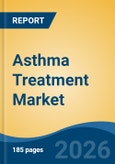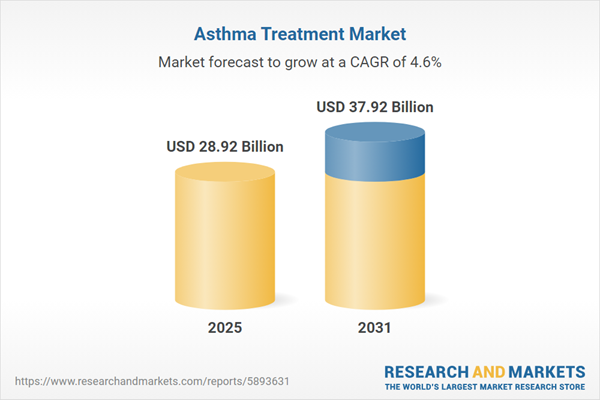Speak directly to the analyst to clarify any post sales queries you may have.
10% Free customizationThis report comes with 10% free customization, enabling you to add data that meets your specific business needs.
The main forces driving this growth include the increasing global incidence of respiratory disorders, which are fueled by rapid urbanization, worsening air pollution, and higher exposure to environmental allergens. Such a rising disease burden creates a critical need for effective long-term care strategies, sustaining the demand for therapeutic solutions. Data from the Global Initiative for Asthma indicates that in 2024, the condition impacted over 260 million people and resulted in roughly 450,000 deaths worldwide, emphasizing the urgent demand for accessible medical care.
Despite these positive growth trends, the market encounters significant obstacles related to the cost and accessibility of modern therapies. The high price points of biologic medications and advanced inhaler devices limit patient access, particularly in low-to-middle-income areas where healthcare reimbursement structures are often inadequate. Additionally, poor patient adherence to prescribed treatment plans acts as a major barrier, lowering therapeutic effectiveness and constraining potential revenue for pharmaceutical companies. These combined economic and behavioral challenges continue to hinder the broader development and reach of the global asthma treatment industry.
Market Drivers
The rising global prevalence of asthma and chronic respiratory conditions serves as the primary engine for market growth, underpinned by rapid urbanization and increasing exposure to environmental pollutants. This escalation in patient numbers generates a continuous, essential demand for effective maintenance treatments as healthcare systems strive to cope with the expanding burden of airway inflammation. The commercial significance of this trend is reflected in the strong performance of established maintenance therapies, which are crucial for daily symptom control. For example, GSK reported in February 2025 that sales of its respiratory maintenance product, Trelegy, grew by 27% in 2024, highlighting the vital requirement for consistent disease management amidst deteriorating global respiratory health.Concurrently, the uptake of targeted biologic therapies and monoclonal antibodies is redefining market value by meeting the specific needs of severe, uncontrolled asthma cases. These precision medicines, designed to block specific inflammatory pathways like those involving eosinophils or IgE, provide better outcomes than standard corticosteroids, allowing for premium pricing and significant revenue expansion. The swift adoption of these next-generation drugs is evident; AstraZeneca noted in February 2025 that full-year 2024 sales for its novel biologic, Tezspire, hit $1.22 billion, signaling a transition toward personalized treatment. Furthermore, the magnitude of this segment is illustrated by leading products; Regeneron reported in February 2025 that global net sales for the blockbuster biologic Dupixent increased by 22% to $14.15 billion in 2024, confirming the major financial impact of precision therapeutics on the total market.
Market Challenges
The elevated costs associated with advanced pharmacological treatments and delivery mechanisms pose a major hurdle to the Global Asthma Treatment Market's progression. While the clinical need for biologics and modern inhalers is increasing, the high price tags of these premium options restrict their usage, especially in areas with limited healthcare reimbursement. When patients are confronted with substantial out-of-pocket costs, they are statistically more prone to skipping doses or abandoning treatment altogether. This economic friction impedes market growth by lowering prescription refill rates and effectively narrowing the addressable market for pharmaceutical developers.This financial pressure creates a disconnect between the high disease prevalence and actual revenue generation. According to the Asthma and Allergy Foundation of America, the estimated annual economic cost of asthma in the United States reached approximately $82 billion in 2025, representing a massive burden that makes funding consistent care difficult. As a result, payers frequently implement rigorous formulary restrictions to control costs, which further limits patient access to effective therapies. Until the gap between economic accessibility and the increasing disease burden is bridged, the market will face difficulties in achieving its full commercial capabilities.
Market Trends
The creation of eco-friendly, low-global warming potential (GWP) inhalers is setting a new industry benchmark as manufacturers adjust their respiratory portfolios to meet strict environmental standards. This trend entails redesigning pressurized metered-dose inhalers (pMDIs) to use advanced propellants such as HFA-152a, which drastically lower the carbon emissions associated with daily treatment without reducing clinical effectiveness. This industry shift is demonstrated by significant investments in green manufacturing and reformulation initiatives. For instance, in its '2024 Sustainability Report' released in June 2025, Chiesi Farmaceutici highlighted a strategic investment exceeding €350 million to replace existing propellants, aiming to cut the product's carbon footprint by up to 90% while ensuring long-term regulatory adherence.At the same time, the introduction of cost-efficient biosimilars and complex generics is transforming the commercial environment by challenging the market dominance of established biologic therapies for severe asthma. As patent protections for major monoclonal antibodies expire, the authorization of interchangeable biosimilars offers payers and healthcare networks lower-cost options, thereby broadening patient access to premium treatments that were once limited by budgetary constraints. This movement toward affordable precision medicine is gathering regulatory speed. In March 2025, Celltrion announced in a press release titled 'FDA Approves Omlyclo as First Interchangeable Biosimilar to Xolair' that it had received U.S. clearance for its omalizumab biosimilar, a key event that brings price competition to the reference product and expands the market for biologic-quality asthma care.
Key Players Profiled in the Asthma Treatment Market
- GlaxoSmithKline, PLC
- AstraZeneca PLC
- Teva Pharmaceutical Industries Ltd.
- Boehringer Ingelheim Gmbh
- Merck & Co. Inc.
- Novartis AG
- Sanofi SA
- Roche Holding AG
- Regeneron Pharmaceutical Inc.
- Pfizer Inc.
Report Scope
In this report, the Global Asthma Treatment Market has been segmented into the following categories:Asthma Treatment Market, by Drug Class:
- Short-Acting Beta-Agonists (SABA)
- Long-Acting Beta-Agonists (LABA)
- Inhaled Corticosteroids (ICS)
- Leukotriene Modifiers
- Immunomodulators
- Combination Drugs
- Others
Asthma Treatment Market, by Mode of Administration:
- Inhalers
- Nebulizers
- Oral Medications
Asthma Treatment Market, by Distribution Channel:
- Hospital Pharmacies
- Retail Pharmacies
- Online Pharmacies
- Others
Asthma Treatment Market, by Region:
- North America
- Europe
- Asia-Pacific
- South America
- Middle East & Africa
Competitive Landscape
Company Profiles: Detailed analysis of the major companies present in the Global Asthma Treatment Market.Available Customization
The analyst offers customization according to your specific needs. The following customization options are available for the report:- Detailed analysis and profiling of additional market players (up to five).
This product will be delivered within 1-3 business days.
Table of Contents
Companies Mentioned
The key players profiled in this Asthma Treatment market report include:- GlaxoSmithKline, PLC
- AstraZeneca PLC
- Teva Pharmaceutical Industries Ltd.
- Boehringer Ingelheim Gmbh
- Merck & Co. Inc.
- Novartis AG
- Sanofi SA
- Roche Holding AG
- Regeneron Pharmaceutical Inc.
- Pfizer Inc.
Table Information
| Report Attribute | Details |
|---|---|
| No. of Pages | 185 |
| Published | January 2026 |
| Forecast Period | 2025 - 2031 |
| Estimated Market Value ( USD | $ 28.92 Billion |
| Forecasted Market Value ( USD | $ 37.92 Billion |
| Compound Annual Growth Rate | 4.6% |
| Regions Covered | Global |
| No. of Companies Mentioned | 11 |









